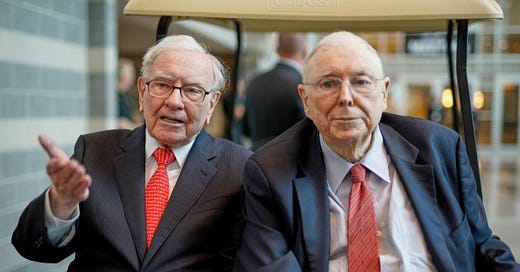Memorializing Munger (#409)
Last week, we said goodbye to Berkshire Hathaway Vice Chair Charlie Munger. He leaves behind a towering legacy and a wealth of valuable lessons
Last week, we bid farewell to Charlie Munger, the legendary Vice Chairman of Berkshire Hathaway whose wisdom profoundly influenced millions of people, including me. Munger was often described as Warren Buffett’s right-hand man; in reality, he was Buffett’s equal partner for over 50 years at the firm and attained a net worth of $2.7 billion through long-term investing.
Munger was also a voracious learner and one of the world’s best thinkers on human behavior. He was particularly celebrated for his succinct and often witty comments on investing, life, leadership and a range of other topics.
Many of Munger’s most popular observations are shared widely by his admirers and frequently referenced as Mungerisms. Wisdom from his speeches, quotes and articles have even been compiled in books such as Poor Charlie’s Almanack, which are considered essential reading for anyone interested in business, investing or the art of clear thinking.
Munger was so prolific that it’s hard to condense to his few best insights. With that said, here are a few of my favorites.
Incentives and Behavior
While Munger shared dozens of famous quotes, one stands out most for me and has significantly impacted my professional journey: “Show me the incentive and I will show you the outcome.”
This simple yet powerful statement has frequently helped me navigate complex individual and organizational challenges. In most cases, behavior and incentives are inextricably linked; you can often predict what people will do by examining how they are rewarded. This quote also works in reverse, I have found that when I am unhappy with an outcome, incorrect or misaligned incentives are often the root of the problem.
Happiness and Expectations
A second Mungerism I love is: “The first rule of happiness is low expectations.”
Many people never attain happiness because no matter how much money, success, living space or possessions they have, they always want more. The more we want, the less happy we are. Munger himself beat this trap: while he was incredibly wealthy, he lived well below his means and donated most of his money to charity.
Happiness is often relative, not absolute. Successfully balancing your expectations to match your means—and learning to be happy with what you have in the moment—is a surer path to fulfillment than always chasing the next tier of wealth or success.
Rules For Career Satisfaction
Munger once told the story of how he first met Buffett and decided to work with him. Munger was introduced to Buffett at a dinner party in Omaha, where the two men discovered they had similar perspectives on business, finance, history and investing. Buffett persuaded Munger to quit his career as a lawyer as soon as he could afford to do so and go into business with Buffett.
Reflecting on one of his best life decisions, Munger concluded the story by sharing three basic rules for career satisfaction:
Work only with people you enjoy.
Don’t work for anyone you don’t respect and admire.
Don’t sell anything you wouldn’t buy yourself.
In these rules, Munger seemed to recognize professional happiness is rooted in values alignment. If you work with people you enjoy, respect and admire and believe strongly in what you’re selling, you’re much more likely to be fulfilled.
Avoiding Errors
Munger and Buffett didn’t earn their fortunes through sudden windfalls. Instead, they focused on doing things that work in the long run and learned to avoid the mistakes that people tend to make over and over again. Munger in particular was excellent at identifying and avoiding common human errors.
For Munger’s expertise in this era, check out “The Psychology of Human Misjudgment”, which is considered the magnum opus on why we repeatedly make the same mistakes. It’s not short, but it’s an amazing read.
Living Life Backwards
As Steve Covey once said, beginning with the end in mind is always a good strategy. Munger exemplified this approach.
Years ago, Munger gave advice to Buffett on how he should live his life, encouraging him to write his obituary the way he would want it written, and then live his life accordingly. The goal was to think about how you want to be remembered and live backwards from there.
One definition of legacy that I love states that we live our lives and others determine our legacy. There is no doubt we will be talking about Munger’s legacy long after he’s gone.
Quote of The Week
"“I constantly see people rise in life who are not the smartest, sometimes not even the most diligent, but they are learning machines. They go to bed every night a little wiser than when they got up and boy does that help—particularly when you have a long run ahead of you." - Charlie Munger
Have a great weekend!
New For Premium Subscribers




I read your newsletter every week. I have to tell you today's was the best. So many goos lessons in here. Thank you for sharing.
Thank you CJ!